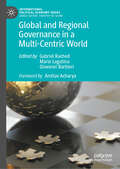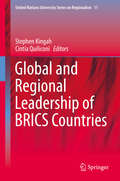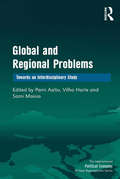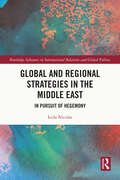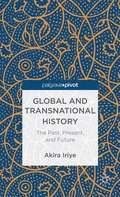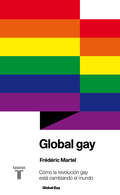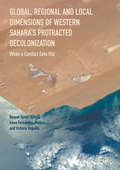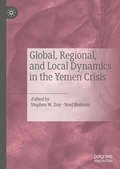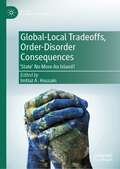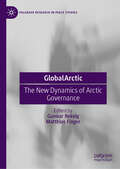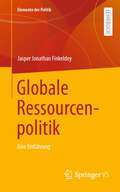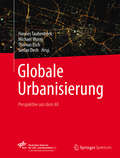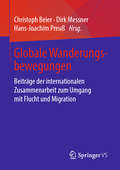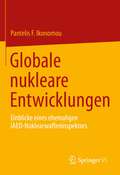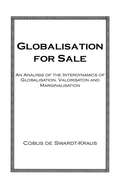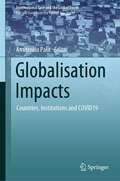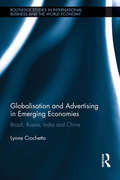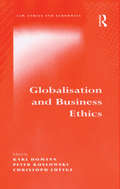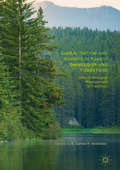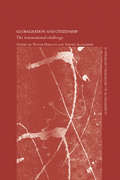- Table View
- List View
Global and International History: Of Limits and Growth
by Stephen J. MacekuraOf Limits and Growth connects three of the most important aspects of the twentieth century: decolonization, the rise of environmentalism, and the United States' support for economic development and modernization in the Third World. It links these trends by revealing how environmental NGOs challenged and reformed the development approaches of the US government, World Bank, and United Nations from the 1960s through the 1990s. The book shows how NGOs promoted the use of 'appropriate' technologies, environmental reviews in the lending process, development plans based on ecological principles, and international cooperation on global issues such as climate change. It also reveals that the 'sustainable development' concept emerged from transnational negotiations in which environmentalists accommodated the developmental aspirations of Third World intellectuals and leaders. In sum, Of Limits and Growth offers a new history of sustainability by elucidating the global origins of environmental activism, the ways in which environmental activists challenged development approaches worldwide, and how environmental non-state actors reshaped the United States' and World Bank's development policies.
Global and Regional Governance in a Multi-Centric World (International Political Economy Series)
by Maria Lagutina Gabriel Rached Giovanni BarbieriIn a world shaken by constant crises and shifting power dynamics, Global and Regional Governance in a Multicentric World delves into the core of the global governance system, exploring its flaws, its evolution, and the forces seeking to reshape it. As the Western-crafted liberal order faces unprecedented scrutiny, this book provides a timely analysis of how emerging powers - China, Brazil, India, South Africa, and others - are challenging traditional governance models, proposing alternatives that better reflect their values, interests, and aspirations. From Asia to Africa, Latin America to Eurasia, this book examines how these regions, collectively known as “the Rest” or “the Global South,” are responding to the shortcomings of a global system long dominated by Western interests. Through insightful regional studies, the authors highlight how “rising powers” are no longer willing to remain peripheral players; instead, they are pushing for a more inclusive, representative, and effective global framework. Rooted in the latest international relations trends, this book offers an incisive exploration of new governance models emerging in a “multi-centric” world. It raises pressing questions about global stability as follows: Will these rising powers succeed in transforming the global order? How do they envision international cooperation? Can their ideas coexist with established Western powers? Through this work, readers gain a nuanced understanding of the forces shaping tomorrow’s world and the potential pathways for reform. Ideal for scholars, policymakers, and those with a keen interest in world affairs, Global and Regional Governance in a Multicentric World is a compelling call to rethink contemporary global governance and the possible paths of the international agenda in an era where traditional multilateralism is no longer able neither sufficient to address the pressing challenges from our interconnected world.
Global and Regional Leadership of BRICS Countries
by Stephen Kingah Cintia QuiliconiThis book presents a systematic collation of the regional and global dimensions of the leadership role of BRICS countries (Brazil, Russia, India, China and South Africa). It analyses the rising regional and global leadership of BRICS, using specific benchmarks to gauge the nature of this leadership. The elements examined include willingness to lead, the capacity to do as much, and the degree to which the given actor is accepted as a leader both within and beyond its region. The chapters in the book capture the nature of trends in regional and global leadership within the contexts of a changing international order. It is taken for granted that Brazil, Russia, India, China and South Africa are now engineering a unique pool of governance that is seeking alternatives to the current order of global economic and political affairs. The fact that these countries have jointly decided to forge ahead with the BRICS constellation of states that is now taking consequential decisions such as the creation of the BRICS' New Development Bank, is not to be treated lightly. In this book the majority of papers take a step back and systematically analyse the real state of the leadership that is provided by the BRICS on a litany of regionally and globally relevant issues. While no one doubts the fact that these countries have the capacity to provide leadership especially in their various regions on many issues, what remains moot is whether they are willing and capable to do so at the global level. Even in those cases where there is the willingness and capacity, the book argues that the acceptance of such leadership by potential followers is not always a given.
Global and Regional Problems: Towards an Interdisciplinary Study (The International Political Economy of New Regionalisms Series)
by Vilho HarleDistinctive due to explicit and systematically developed links between international relations (IR) and related disciplines, this book addresses global and regional interactions and the complex policy problems that often characterise this agenda. Such enhanced communication is crucial for improving the capacity of IR to engage with concrete issues that today are of high policy relevance for international organisations, states, diplomats, mediators and humankind in general. Whilst the authors do not reject the present IR, they offer a wider research agenda with new directions intended not only for those IR scholars who are unsatisfied with the analytical power of the current discipline, but also for those working on 'international', 'foreign', 'global' or 'interregional' issues in other disciplines and fields of research. In this instance they pay particular attention to linking up with peace research, international political economy (IPE) and cultural political economy (CPE), sociology, political geography, development studies, linguistics, cultural studies, environmental studies and energy research, gender studies, and traditions of area studies.
Global and Regional Strategies in the Middle East: In Pursuit of Hegemony (ISSN)
by Leila NicolasGlobal and Regional Strategies in the Middle East explores hegemony in the Middle East through understanding different dimensions of power politics and the consequences of the hegemonic ambitions of both global and regional powers.The book adds new aspects to the extensive literature on grand strategies in the Middle East by exploring and evaluating competing strategies from an "insider" perspective. First, it highlights the main determinants of Global powers' grand strategies, assesses the ones applied in the Middle East, and forecasts future strategies after the Ukraine war in alignment with other rival states' capabilities and goals. It then underlines regional dynamics and the hegemonic quest of regional powers and their power politics' determinants since the "War on terror," the Arab Spring, and, more recently, the Russian intervention in Ukraine and Israel-Gaza conflict. The book broadens readers' perspectives by clarifying the region's dynamics that shaped the global and regional power rivalries, where security concerns, economic interests, oil supplies, and hegemonic ambitions make it complicated for the US to keep influence and the total control it had during the late 20th century.This book will be of great interest to scholars and students of the MENA region, International Relations and Strategic Studies.
Global and Transnational History
by Akira IriyeIt is no exaggeration to say that the study of history has been transformed significantly during the last twenty-odd years. Akira Iriye, the world authority on transnational history, examines the emergence and growth of global and transnational history, away from more traditional, nation-centred perspectives.
Global gay
by Frédéric MartelUna investigación sin precedentes alrededor del mundo sobre la cuestión gay. De una esquina a otra del planeta, la revolución gay está en marcha. De la resistencia contra la represión en China, Cuba o Irán al activismo a favor del matrimonio para parejas del mismo sexo en Estados Unidos y en Europa. De lo underground al mainstream. De la criminalización de la homosexualidad a la criminalización de la homofobia. Durante cinco años Frédéric Martel ha llevado a cabo un estudio sin precedentes en cuarenta y cinco países, desde los más abiertos a los más hostiles, reuniéndose con centenares de actores de esta revolución. A través de ese novedoso prisma, este libro dibuja una verdadera geopolítica de la globalización gay analizando los cambios en los modos de vida, la redefinición del matrimonio, la emancipación paralela de las mujeres y los homosexuales o el impacto decisivo que han supuesto Internet y las redes sociales. Aunque se desarrollen bajo una misma bandera, las singularidades de la vida local y la ausencia de homogeneidad de las comunidades gays de todo el mundo son fascinantes. Martel descubre que la globalización no se traduce necesariamente en uniformización: la diversidad es infinita. Como termómetro de la evolución de las mentalidades, la cuestión gay se ha convertido en un valioso criterio para juzgar el estado de una democracia y la modernidad de un país. Este libro, rico en retratos y testimonios sorprendentes, cuenta este nuevo frente en el que ahora se libra la batalla por los derechos del hombre. Reseñas:«Libro-investigación que se lee como una historia que cuenta la nueva batalla de los derechos humanos.»Slate «La homosexualidad presenta mil caras distintas en todo el mundo y este formidable ensayo sociológico sobre la revolución gay firmado por Frédéric Martel ofrece una síntesis esclarecedora.»Le Point «Cuando Frédéric Martel dice que se ha propuesto averiguar cómo funciona un fenómeno de masas, va en serio. Quiere decir que va a pasar años viajando por una cincuentena de países de todo el mundo, que va a entrevistar a miles de personajes pequeños y grandes y va a escribir un libro con conclusiones a las que pocos hemos llegado antes.»ICON
Global politics in the 21st century
by Robert J. JacksonObjective, critical, optimistic, and with a global focus, this textbook combines international relations theory, history, up-to-date research, and current affairs to give students a comprehensive, unbiased understanding of international politics. It integrates theory and traditional approaches with globalization and research on such topics as terrorism, new economic superpowers, and global communications and social networking to offer unusual breadth and depth for an undergraduate course. The text is enhanced by box features and 'Close Up' sections with context and further information; 'Critical Case Studies' highlighting controversial and complex current affairs that show how the world works in practice; and questions to stimulate discussion, review key concepts, and encourage further study. Unlike any other textbook, Global Politics in the 21st Century demonstrates the significance and interconnectivity of globalization and new security challenges in the twenty-first century and illuminates the role of leadership in transnational crises.
Global, Regional and Local Dimensions of Western Sahara’s Protracted Decolonization
by Raquel Ojeda-Garcia Irene Fernández-Molina Victoria VeguillaThis book explores the traces of the passage of time on the protracted and intractable conflict of Western Sahara. The authors offer a multilevel analysis of recent developments from the global to the local scenes, including the collapse of the architecture of the UN-led conflict resolution process, the advent of the War on Terror to the the Sahara-Sahel area and the impact of the 'Arab Spring' and growing regional security instability. Special attention is devoted to changes in the Western Sahara territory annexed by Morocco and the Sahrawi refugee camps in Algeria. Morocco has adapted its governance and public policies to profound socio-demographic transformations in the territory under its control and has attempted to obtain international recognition for this annexation by proposing an Autonomy Plan. The Polisario Front and Sahrawi nationalists have shifted their strategy and pushed the centre of gravity of the conflict back inwards by focusing on pro-independence activism inside the disputed territory.
Global, Regional, and Local Dynamics in the Yemen Crisis
by Stephen W. Day Noel BrehonyThis international relations study investigates the underlying causes of the Yemen crisis by analyzing the interactions of global, regional, and local actors. At all phases, GCC member states played a key role, from political negotiations amidst street protests in 2011 to formation of an international military coalition in 2015. Using a multi-actor model, the book shows that various actors, whether state or non-state, foreign or domestic, combined to create a disastrous armed conflict and humanitarian crisis. Yemen’s tragedy is often blamed on Saudi Arabia and its rivalry with Iran, which is usually defined in sectarian “Sunni-Shia” terms, yet the book presents a more complex picture of what happened due to involvement by many other foreign actors, such as the UAE, UN, UK, US, EU, Russia, China, Turkey, Oman, Qatar, and African states of the Red Sea and Horn of Africa.
Global-Local Tradeoffs, Order-Disorder Consequences: 'State' No More An Island? (Global Political Transitions)
by Imtiaz A. HussainIn this book, ten substantive chapters examine how collisions between technological developments (globalizing forces) and thickening populist pressures (localizing dynamics) constantly keep reinventing the state in unforeseen and unpredictable ways. We learn of how international organizations have fared, and to what extent grass-roots grumbles have impacted big-picture developments in quite diverse parts of the world. Just placing unfolding crises under the microscope cannot but generate policy-solving observations. Treated in corresponding order, these crises revolve around adjusting international institutions; absorbing current populist outbursts; shifting from peacekeeping to peacemaking; spying in the global south; absorbing displaced persons; Rwandan land reform; pandemic and RMG readjustments; Bangladesh’s democratic transition; Rohingyan-Syrian refugees; and Mexico’s 1990s liberalization. Though overarching, observations in the book accent state strength battling with state porosity; the downward spiraling of global order; and the simple lack of any controlling mechanism against globalizing/localizing dynamics in the trenches of everyday life being matched by continued uncertainty on the analytical plane.
GlobalArctic: The New Dynamics of Arctic Governance (Palgrave Research in Peace Studies)
by Matthias Finger Gunnar RekvigThe third volume in the Global Arctic series examines the transformation of Arctic governance following the 2022 outbreak of war in Ukraine. This conflict has disrupted the post-Cold War cooperative circumpolar order, upending decades of multilateral collaborations. The book traces the Arctic's evolution from Cold War great power competition to a focus on human security and cooperation, highlighting the Arctic Council's establishment and the growth of the "Arctic family" with non-Arctic actors. It explores how climate change became a key driver for Arctic (re)engagement, opening new opportunities and challenges. The 2022 invasion of Ukraine has dramatically altered this landscape, ending the post-Cold War era of collaboration and ushering in the post-post-Cold War era, raising critical questions about regional cooperation, climate change mitigation, and global security. This book brings together diverse expert perspectives to analyze the rapidly changing geopolitical dynamics of the Arctic. It explores the tension between collaboration needs and resurgent great power competition, offering valuable insights for policymakers, scholars, and students. As global power dynamics shift and climate change threatens, understanding Arctic governance challenges becomes imperative. This book serves as an essential resource for navigating the complex Arctic political landscape and examining how new divisions are reshaping the region's future.
Globale Ressourcenpolitik: Eine Einführung (Elemente der Politik)
by Jasper Jonathan FinkeldeyDieses Lehrbuch setzt sich mit den zentralen Institutionen, Akteuren und politischen Prozessen um die globale Verteilung und Nutzung kritischer natürlicher Ressourcen auseinander. Einige Stimmen sehen die Welt bereits im Zeitalter der Ressourcenkriege angekommen, andere betonen, dass Ressourcenknappheit auch zu neuen Kooperationen im internationalen System führe. Unter dem Begriff „natürlicher Ressourcen“ werden sowohl nachwachsende (z.B. Getreideprodukte, Holz) sowie nicht-nachwachsende Ressourcen (z.B. Rohöl oder Erdgas) gefasst, deren Verteilung und Nutzung politischen und ökonomischen Prozesse unterliegen.
Globale Urbanisierung
by Stefan Dech Thomas Esch Hannes Taubenböck Michael WurmAuf dem ganzen Erdball drängen die Menschen vom Land in die Städte. Den prognostizierten globalen Bevölkerungszuwachs werden komplett die Städte auffangen. Mit dieser gewaltigen Wanderungsbewegung gehen dramatische Veränderungen der globalen Siedlungslandschaft einher: Neue Millionenstädte entstehen aus dem Nichts, Slums wuchern in jede noch so kleine städtische Freifläche, Megacities fressen sich unaufhaltsam ins Hinterland. Vorstädte erstrecken sich ins Unendliche, Städte verschmelzen miteinander und urbane Zentren wachsen in den Himmel. Stadtlandschaften entstehen in neuen Dimensionen, Strukturen und Mustern. Megaregionen mit mehr als 100 Millionen Einwohnern definieren eine neue urbane Geographie. Die globale Stadt ist dauerhaft im Wandel, dynamischer als jemals zuvor. Erdbeobachtung aus dem All bietet einen einzigartigen Blick auf die Siedlungslandschaften unseres Planeten. Exemplarisch visualisiert das Cover leuchtende Straßenzüge bei Nacht und macht damit die pulsierenden Lebensadern einer Stadt sichtbar. Bisher hatte die Forschung im fernerkundlichen Bereich jedoch überwiegend methodische Entwicklungen im Fokus. Dieses Buch setzt die Ergebnisse der Erdbeobachtung gezielt ein, um raumwissenschaftliche Erkenntnisse zu Fragestellungen im Kontext globaler Urbanisierung zu erlangen. Dabei präsentieren die Autoren Studien zu Städten und Regionen auf allen fünf Kontinenten der Erde, zu großen und kleinen Städten, zu geplanten und ungeplanten, zu alten und neuen, zu armen und reichen, zu erfolgreichen oder gefährdeten. Es zeichnet ein umfassendes Bild globaler Urbanisierungsprozesse und ihrer räumlichen Auswirkungen. Die gebaute Stadt wird ebenso betrachtet und analysiert wie ihre Auswirkungen auf den sie umgebenden Raum und die Rückkopplung mit den in den Städten lebenden Menschen. Urbanisierung ist mehr als die Summe ihrer demographischen, funktionalen oder morphologischen Aspekte. Im Verbund mit anderen wissenschaftlichen Disziplinen eröffnet die Fernerkundung neuartige Perspektiven und Erkenntnisse zu dieser komplexen Thematik.
Globale Urbanisierung: Perspektive aus dem All
by Stefan Dech Thomas Esch Hannes Taubenböck Michael WurmAuf dem ganzen Erdball drängen die Menschen vom Land in die Städte. Den prognostizierten globalen Bevölkerungszuwachs werden komplett die Städte auffangen. Mit dieser gewaltigen Wanderungsbewegung gehen dramatische Veränderungen der globalen Siedlungslandschaft einher: Neue Millionenstädte entstehen aus dem Nichts, Slums wuchern in jede noch so kleine städtische Freifläche, Megacities fressen sich unaufhaltsam ins Hinterland. Vorstädte erstrecken sich ins Unendliche, Städte verschmelzen miteinander und urbane Zentren wachsen in den Himmel. Stadtlandschaften entstehen in neuen Dimensionen, Strukturen und Mustern. Megaregionen mit mehr als 100 Millionen Einwohnern definieren eine neue urbane Geographie. Die globale Stadt ist dauerhaft im Wandel, dynamischer als jemals zuvor. Erdbeobachtung aus dem All bietet einen einzigartigen Blick auf die Siedlungslandschaften unseres Planeten. Exemplarisch visualisiert das Cover leuchtende Straßenzüge bei Nacht und macht damit die pulsierenden Lebensadern einer Stadt sichtbar. Bisher hatte die Forschung im fernerkundlichen Bereich jedoch überwiegend methodische Entwicklungen im Fokus. Dieses Buch setzt die Ergebnisse der Erdbeobachtung gezielt ein, um raumwissenschaftliche Erkenntnisse zu Fragestellungen im Kontext globaler Urbanisierung zu erlangen. Dabei präsentieren die Autoren Studien zu Städten und Regionen auf allen fünf Kontinenten der Erde, zu großen und kleinen Städten, zu geplanten und ungeplanten, zu alten und neuen, zu armen und reichen, zu erfolgreichen oder gefährdeten. Es zeichnet ein umfassendes Bild globaler Urbanisierungsprozesse und ihrer räumlichen Auswirkungen. Die gebaute Stadt wird ebenso betrachtet und analysiert wie ihre Auswirkungen auf den sie umgebenden Raum und die Rückkopplung mit den in den Städten lebenden Menschen. Urbanisierung ist mehr als die Summe ihrer demographischen, funktionalen oder morphologischen Aspekte. Im Verbund mit anderen wissenschaftlichen Disziplinen eröffnet die Fernerkundung neuartige Perspektiven und Erkenntnisse zu dieser komplexen Thematik.
Globale Wanderungsbewegungen: Beiträge der internationalen Zusammenarbeit zum Umgang mit Flucht und Migration
by Christoph Beier Dirk Messner Hans-Joachim PreußNach wie vor sind praktikable Vorschläge für den Umgang mit Flucht und Vertreibung aufgrund von Gewalt, das Management von globalen Wanderungsbewegungen und die Integration von Flüchtlingen und Migranten rar. Dieses Buch wirft vor dem Hintergrund der aktuellen Debatten um den richtigen Umgang mit Flucht und Migration einen Blick auf langfristig wirksame Lösungen. In den verschiedenen Kapiteln beleuchten Fachleute aus Wissenschaft, Politik und Praxis die Ursachen für globale Wanderungsbewegungen und die Konsequenzen von Migration auf politischer, wirtschaftlicher und sozialer Ebene. Dabei stehen nicht die Vermeidung von Wanderungsbewegungen, sondern vor allem die Nutzung positiver Effekte in Herkunfts-, Transit- und Zielländern im Mittelpunkt der Diskussion.Die HerausgeberChristoph Beier ist Leiter des Programms “Good Governance for LocalDevelopment, South Caucasus” mit Sitz in Tiflis, Georgien. Bis 2019 war er stellvertretender Vorstandssprecher der Deutschen Gesellschaft für InternationaleZusammenarbeit (GIZ) GmbH in Eschborn und Bonn.Dirk Messner ist Präsident des Umweltbundesamtes in Dessau. Bis 2019 war erDirektor des Institute for Environment and Human Security an der Universität derVereinten Nationen in Bonn.Hans-Joachim Preuß ist Repräsentant der Friedrich-Ebert-Stiftung in Benin.Zuvor war er bis Juni 2018 Vorstandsmitglied der Deutschen Gesellschaft fürInternationale Zusammenarbeit (GIZ) GmbH in Eschborn und Bonn.
Globale nukleare Entwicklungen: Einblicke eines ehemaligen IAEO- Nuklearwaffeninspektors
by Pantelis F. IkonomouDieses Buch wurde von einem ehemaligen Nuklearinspektor der Internationalen Atomenergiebehörde (IAEO) und Experten für nukleare Sicherheit geschrieben und bietet einen umfassenden und authentischen Überblick über die aktuellen globalen Entwicklungen im Nuklearbereich. Der Autor gibt detaillierte Einblicke in aktuelle und vergangene Nuklearkrisen und legt die technischen Fähigkeiten, politischen Strategien und Motive der Besitzer von Atomwaffen offen. Durch die Analyse der Nuklearprogramme und -strategien verschiedener Länder, darunter die USA, Russland, China, Großbritannien und Frankreich, verdeutlicht dieses Buch die bestehende globale nukleare Bedrohung und die damit verbundenen Risiken für die Menschheit. Es beschreibt auch die derzeitigen Blockaden und zeigt mögliche Auswege auf. Aufgrund seines Umfangs wird das Buch Wissenschaftler und politische Entscheidungsträger ansprechen, die daran interessiert sind, neue Einblicke in sensible oder komplexe Nuklearprogramme verschiedener Länder zu gewinnen.
Globaler Katholizismus, Toleranz und die offene Gesellschaft: Eine empirische Studie über die Wertesysteme der Katholiken
by Arno Tausch Stanislaw ObirekDieses Buch bewertet systematisch die politischen und sozialen Werte der mehr als 1,3 Milliarden Katholiken auf der ganzen Welt, der bei weitem größten Konfession des westlichen Christentums. Auf der Grundlage einer umfassenden Analyse von Daten aus dem World Values Survey und anderen globalen Meinungsumfragen wirft das Buch ein neues Licht auf die Wertesysteme und Meinungen der Katholiken. Die Autoren heben zentrale Probleme und Herausforderungen hervor, mit denen die Kirche derzeit bei der Anpassung an die moderne Welt konfrontiert ist, einschließlich des katholischen Antisemitismus, der religiösen und sexuellen Toleranz und der Meinungen zur Demokratie, und bieten gleichzeitig eine anthropologische Reflexion darüber, wie gut sich die Kirche an die Anforderungen einer offenen Gesellschaft anpasst oder nicht.
Globalisation For Sale
by Swardt-KrausFirst published in 2001. Routledge is an imprint of Taylor & Francis, an informa company.
Globalisation Impacts: Countries, Institutions and COVID19 (International Law and the Global South)
by Amitendu PalitThe book reviews globalisation by identifying causes behind the discontent it has produced in recent years. It variously engages in economics, political economy, development and policy discourses to study experiences of countries and institutions in managing and adjusting to globalisation. Extending the analysis to latest global developments, including the remarkable advance of technology and digitalisation, and political and economic upheavals caused by COVID19, the book collects varied academic perspectives and reflects on the present as well as future. Comprising chapters written by distinguished academics and policy experts, the book is a rare collection of cross-disciplinary objective evaluations of globalisation.
Globalisation and Advertising in Emerging Economies: Brazil, Russia, India and China (Routledge Studies in International Business and the World Economy)
by Lynne CiochettoBrazil, Russia, India and China are four of the largest and most dynamic contemporary emerging economies in the world. Strong economic growth in each of these economies has been accompanied by the expansion of the advertising and consumer goods sectors. Using a series of country studies, this book explores the dynamics of global capitalism from the perspective of global advertising. The book highlights the on-going expansion of advertising and consumerism against the wider socio-economic, political and cultural contexts. It provides fresh insights about contemporary global priorities, and argues that advertising plays a key role linking culture and the economy. By presenting individual case studies of advertising campaigns, it offers examples of the globalisation of specific brands. Environmental implications of the expansion of advertising and its role in stimulating consumerism are explored in the context of the four emerging economies. The book compares and contrasts the individual country profiles, and makes an assessment of the validity of the argument regarding their projected importance and the likelihood of their future dominance of the global economy.
Globalisation and Agricultural Landscapes: Change Patterns and Policy Trends in Developed Countries
by Jørgen Primdahl Simon SwaffieldWhilst agricultural landscapes are products of the local ecosystem and community in which they are situated, they are becoming increasingly affected by the same global issues, and are converging under the dynamics of globalisation. Combining landscape ecological research and an examination of relevant public policy, this book investigates the dynamic relationship between agricultural landscapes and the global change processes, such as urbanisation, by which they are being transformed. Landscape change is analysed in the context of biophysical patterns, market dynamics, and specific public policy frameworks, through a series of case studies from different OECD countries spanning Europe, Asia Pacific and North America. Particular emphasis is placed upon the way that landscapes are changing under differing policies of agricultural subsidy including the EU Common Agricultural Policy. This is an ideal resource for graduate students and researchers in landscape ecology and agriculture as well as policy analysts working in the agricultural sector.
Globalisation and Business Ethics (Law, Ethics And Economics Ser.)
by Peter Koslowski Karl HomannGlobalization has become a common phenomenon, yet one that many people experience as a threat not only to their economic existence, but also to their cultural and moral self-image. This volume takes an interdisciplinary approach to provide a theoretical overview of how business ethics deals with the phenomenon of globalization. The authors first examine the origins and development of globalization and its interaction with business ethics, before discussing the impact on and role of national and multinational corporations. The book goes on to examine the relationship between industrialized and developing countries, and explores the place of ethics in globalized markets.
Globalisation and Change in Forest Ownership and Forest Use
by E. Carina KeskitaloThis book describes the changing landscape of European forest ownership and explores the impact a new, often urban, generation of forest owners may have on the future of one of our most basic resources – forests. Forests have not played a major role in rural studies thus far, however they constitute an important part of many rural areas. Drawing on Swedish cases and comparison cases from various other areas of Europe, the authors present these ‘new forest owners’ as a pivotal factor in the changing relationships between urban and rural life. The chapters explore how forest production, the relationship to the environment, urban-rural relations and local communities have already changed as well as discussing what might be expected for the future. A result of work in the Swedish research programme PLURAL and related projects, such as the EU Cost Action FACESMAP, this volume will be of interest to scholars of forestry and rural studies, as well as to researchers in environmental, population and globalization studies more broadly.
Globalisation and Citizenship: The Transnational Challenge (Challenges of Globalisation)
by Steven Slaughter Wayne HudsonThis wide-ranging volume explores the impact of globalization upon citizenship, with a special focus on the transnational challenges that globalization poses. While there is much debate over the concept, globalization implies at least two distinct phenomena. First, it suggests that political, economic and social activities are becoming increasingly inter-regional or intercontinental in scope. Secondly, it suggests that there has been an intensification of levels of interaction and interconnectedness between states and societies. Citizenship, as one of the foundational concepts of the modern liberal democratic states, provides the normative framework within which globalization debates may be understood and evaluated. It also examines how different concepts, theories and practices of citizenship are evolving in response to globalization. Central questions explored in this text are: • How does globalization challenge traditional conceptions of citizenship in specific respects?• How is globalization creating new citizenships or new civil society spaces?• How is transnational citizenship developing and what problems are associated with it in specific areas? Discussing the theoretical and practical prospects for new forms of liberal, republican and cosmopolitan citizenship, Globalisation and Citizenship will appeal to students and scholars in the fields of international relations, globalization, sociology and political science.

